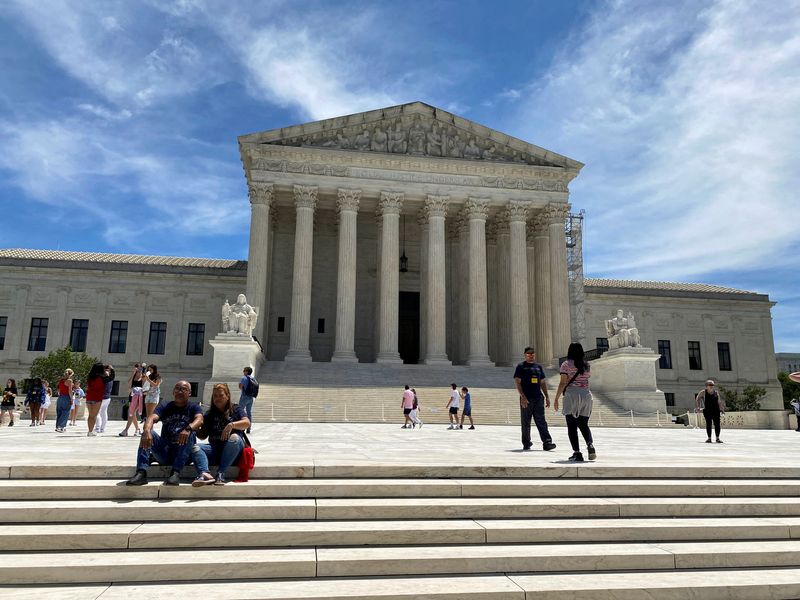By Andrew Chung
WASHINGTON (Reuters) -The U.S. Supreme Court preserved a tax on Americans who have invested in certain foreign corporations as constitutionally sound, ruling on Thursday against a challenge to it at a time when some Democratic lawmakers are seeking to impose a wealth tax on the super rich.
The justices, in a 7-2 ruling, upheld a lower court's decision against Charles and Kathleen Moore - a retired couple from Redmond, Washington - who challenged the tax imposed on foreign company earnings, even though those profits have not been distributed to shareholders.
The one-time "mandatory repatriation tax" (MRT) was part of a Republican-backed tax law passed by Congress and signed by former President Donald Trump in 2017. It applies to owners of at least 10% of a foreign company controlled by Americans.
At issue in the case was whether this tax on unrealized gains was allowed under the U.S. Constitution's 16th Amendment, which enables Congress to "collect taxes on incomes."
The Moores, backed by the Competitive Enterprise Institute and other conservative and business groups, contended that "income" means only those gains that are realized through payment to the taxpayer, not a mere increase in the value of property.
Justice Brett Kavanaugh, whose majority opinion in the case was joined by fellow conservative Chief Justice John Roberts and the court's three liberal members, said that the MRT "does tax realized income - namely, income realized by the corporation," attributes that undistributed income to shareholders, and taxes them on their share of it.
"The MRT therefore falls squarely within Congress's constitutional authority to tax," Kavanaugh wrote.
Kavanaugh emphasized that the court was not deciding a key dispute in the case, namely whether an economic gain must be realized or not to be considered income - a critical question related to the idea of a wealth tax.
Justice Amy Coney Barrett, who agreed with the outcome of the case but wrote a separate opinion joined by fellow conservative Justice Samuel Alito, previewed her view of whether the Constitution allows Congress to tax unrealized sums without apportionment among the states.
"The answer is straightforward: No," Barrett wrote.
Conservative Justices Clarence Thomas and Neil Gorsuch dissented, also noting that "unrealized gains could not be taxed as 'income'" under the 16th Amendment.
The Moores were seeking a refund of nearly $14,729 in taxes that the law required them to pay as minority shareholders in a company in Bangalore, India, called KisanKraft that supplies equipment to farmers.
During arguments in the case in December, some of the justices probed the limits of congressional taxation power over wealth, while others expressed concern that a ruling favoring the Moores could imperil a wider array of tax code provisions including those related to other business entities such as partnerships, limited liability companies and S-corporations.
The Justice Department had said that a ruling by the Supreme Court invalidating the MRT could have cost the U.S. government $340 billion over the next decade - and potentially far more if the decision invalidates other tax provisions as well.
Such a ruling also could have thwarted legislative proposals favored by some Democrats, including Senator Elizabeth Warren, for a tax on the net worth - meaning all assets and not just income - of super-rich Americans. Such proposals face an uphill battle in Congress, especially with the House of Representatives controlled by Republicans.

Democratic senators had urged Alito to not participate in the case because David Rivkin Jr., one of the lawyers for the Moores, co-authored Wall Street Journal articles in which the justice both defended the court and argued that Congress lacks power to regulate the Supreme Court. Senate Democrats have pursued ethics legislation that would apply to the court.
The senators argued that Rivkin's access to Alito and his efforts to help him "air his personal grievances" cast doubt on the justice's ability to fairly judge the case. Alito has said Rivkin's role in the articles was "as a journalist, not an advocate."
